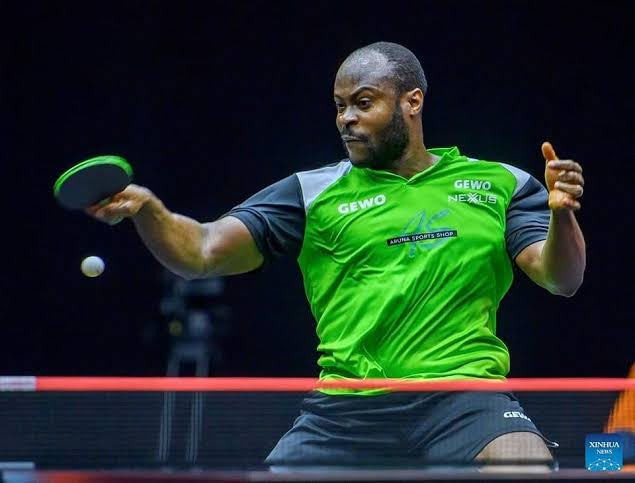Nigeria’s table tennis icon, Quadri Aruna, has once again voiced his frustration over what he describes as years of neglect by the Nigerian government, despite a career marked by groundbreaking achievements on the world stage.
In a heartfelt Facebook post on Sunday, the 36-year-old lamented that for more than 15 years, he has relied almost entirely on personal sacrifices and private sponsorships to stay competitive, while the government has offered little or no meaningful support.
“Tournaments without a coach”
Aruna, currently Africa’s top-ranked player and globally admired for his aggressive attacking style, recounted how he left Nigeria 15 years ago to pursue a professional career in Portugal’s Super League.
There, he found consistent competition and crucial backing from Wahid Enitan Oshodi, then a private benefactor, now President of the Africa Table Tennis Federation.
“With zero support from Nigeria government, I played 99% of the tournaments without a coach and I travelled most of the time alone,” Aruna revealed.
He pointed to the 2014 ITTF World Cup in Düsseldorf as a defining moment. With his sponsor Joola providing a German coach and Oshodi footing his travel and accommodation bills, Aruna stormed into the quarter-finals, the first African player ever to do so.
Similarly, ahead of the Rio 2016 Olympics, Oshodi once more stepped in, securing a rare local sponsor, betting company Babajebu.
The three-year partnership, Aruna said, was pivotal in his preparation. “That deal gave me the strength to focus fully, and the result was Rio,” he reflected, where he shocked the world by reaching the Olympic quarter-finals, another historic feat for Africa.
Government support “limited to one tournament”
Outside these private interventions, Aruna insists his journey has been one of abandonment.
“Year after year, I keep playing without a coach because Nigeria refused to support me. If I feature in 12 tournaments in a year, Nigeria only pays for one tournament, which is mostly an African event. The rest are self-sponsored or supported by my sponsor, GEWO,” he lamented.
His ordeal continued as recently as the 2025 ITTF World Championships in Doha. Aruna disclosed he had to personally buy his ticket after officials failed to act on time.
Worse still, his coach, Dotun Omoniyi, who had guided him to two opening wins, was abruptly asked to return home when the Nigeria Table Tennis Federation claimed there was no money to adjust his travel.
“I had no choice but to pay a friend from Togo to extend his stay and coach me during the knockout rounds,” Aruna explained. With that assistance, he battled his way into the Round of 16.
A decorated career, little recognition
Aruna’s career is decorated with milestones that have elevated African table tennis globally:
First African to reach the quarter-finals of the ITTF World Cup (2014).
Historic Olympic quarter-finalist at Rio 2016.
Peaked at World No. 10 in 2022, the highest-ever ranking for an African player.
Multiple ITTF Africa Cup titles, Commonwealth medals, and leading Nigeria to continental triumphs.
Yet, despite these accomplishments, Aruna has often complained of a system that celebrates his victories but rarely invests in them.
Sports analysts frequently compare his struggles with the heavy backing elite players enjoy in countries like China, Germany, and Japan, where athletes travel with full coaching and support staff. By contrast, Aruna says he has spent much of his career competing alone.
It’s time to invest in young players
Although he has become one of Nigeria’s biggest sports exports outside football and athletics, Aruna insists his concern goes beyond himself.
“It’s time. It’s very important Nigeria start to invest in the present young players to attend tournaments regularly,” he urged.
The world-renowned athlete concluded his post by thanking his international supporters and expressing hope for his country.
“I’m grateful to everyone who has stood by me through the years. I still believe in Nigeria, and I pray the system changes for the better,” he states.
Aruna’s outcry has once again thrown a harsh spotlight on Nigeria’s sports administration, fueling questions about how one of Africa’s most decorated athletes continues to struggle for the very support that should come naturally from his home country.
